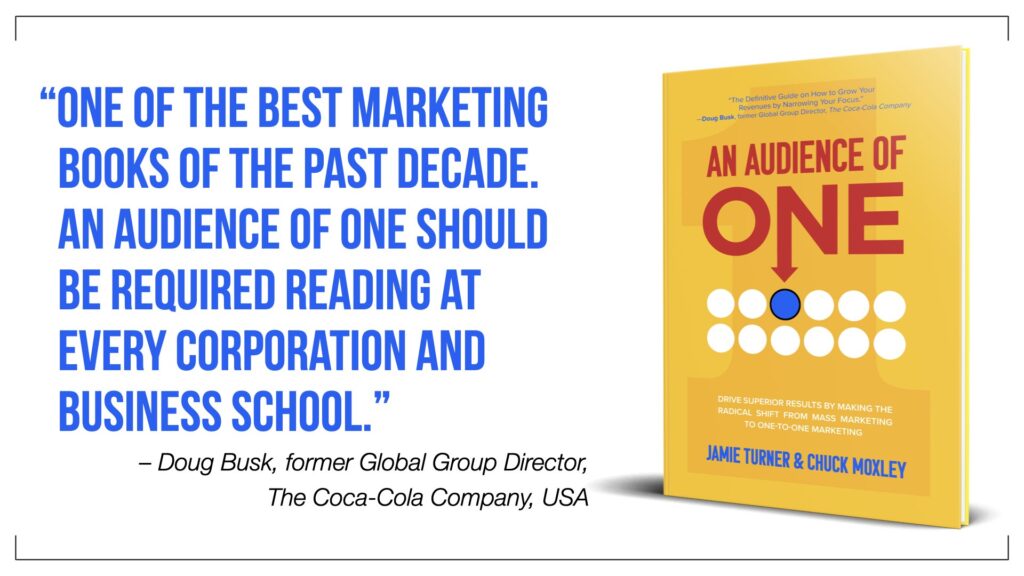If you’re like most people reading this, you’re starting to hear a lot about one-to-one marketing. That’s not surprising. After all, one-to-one is being used by brands like P&G, Amazon, Nike, and others to hyper-target prospects based on data about those prospects and then follow them through the sales funnel to see if they purchased the product — even if they purchased the product at a bricks-and-mortar retailer.
In other words, one-to-one connects the dots between anonymized data about consumers and their final purchase of the product.
One-to-one is creating such a big stir that the essential book about the topic, An Audience of One, has been called “One of the best marketing books of the past decade” by a former Global Group Head at The Coca-Cola Company.
David Taylor, the CEO of Procter & Gamble (the maker of Tide, Crest, Pampers, etc.) is a big fan about the power of one-to-one.
We are reinventing brand building, from wasteful mass marketing to mass one-to-one brand building fueled by data and technology. – David Taylor, CEO, P&G
(Source: The Wall Street Journal, April 8th, 2021)
One-to-one marketing, which is sometimes called people-based marketing, precision marketing, and 1:1 marketing, seeks to hyper-target prospective customers based on their shopping data, their behaviors, their demographics, their psychographics and up to 1450 other data points about them.
All of this data is then used to create a customer profile. But get this — the customer profile is created in a way that the customer is anonymous to the brand. In other words, all of this information can be used to target the customer while also protecting the customer’s privacy.
One-to-one is about using data to create relevant, meaningful campaigns that target individuals rather than mass markets.
One of the many unique things about one-to-one is its ability to create marketing campaigns that are more personalized than traditional mass marketing campaigns.
In fact, “personalization” was named the marketing word of the year by the Association of National Advertisers (ANA) in 2019, showing that most industry professionals are on board with one of the key concepts behind one-to-one.
If you would like to learn more about one-to-one marketing, check out the 50 Essential Facts About One-to-One Marketing below — these facts just might change how you do business.
One-to-One Marketing Increases Customer Engagement
- 91% of consumers are more likely to buy from brands that recognize their consumers and provide relevant offers. (Accenture Interactive)
- 56% of consumers said they would buy from a retailer that recognized them by name. (Accenture Interactive)
- 65% of consumers also said that they would purchase from retailers that knew their purchase history. (Accenture Interactive)
- 80% of consumers are more likely to purchase from brands that place effort on providing personalized experiences. (Epsilon)
- 72% of all consumers in 2019 only engaged with marketing materials specifically customized to them. (SmarterHQ)
- 70% of consumers said they would be more likely to purchase from a company that demonstrated knowledge on how they personally used the products and/or services. (Salesforce)
- Personalized calls to action convert 202% better than non-personalized ones. That’s slightly more than double! (Hubspot)
Consumers Prefer a Personalized Touch
- 78% of U.S. Internet users reported that personally relevant content increases their purchasing intent. (Marketing Insider Group)
- 90% of consumers are willing to provide behavioral data if it improves their shopping experience. (SmarterHQ)
- Only 4% of consumers stated that they are not interested in being involved with personalized marketing in any way. (SmarterHQ)
- In fact, 71% of consumers actually feel frustrated when the shopping process seems impersonal. (Segment)
- 70% of millennials, the now majority generation, dislike when brands send them irrelevant marketing emails that are random or irrelevant such as blast communications. (SmarterHQ)
- A mere 22% of shoppers are satisfied with the level of personalization they currently receive. (Segment)
- About 75% of all consumers expressed interest in the idea of “living profiles”, or very detailed customer profiles that companies can use. (Accenture)
- 67% of consumers are also interested in up-to-date and real-time advertising experiences. (Accenture)
- 47% of all consumers look to Amazon specifically if a specific brand doesn’t provide relevant product suggestions. (SmarterHQ)
- 48% of consumers said that they would be okay with companies acquiring information on their purchase history if they were given the option of opting out whenever they wanted. (Statista)
- 74% of online consumers even state that they get frustrated when content, such as ads, appears on websites that have no relevance to their interests. (Hubspot)
- 36% of consumers actually believe that brands should have room to offer even more personalization in their marketing strategies. (Retail TouchPoints)
Interested in learning more about one-to-one marketing? Click the image below to order your copy of the essential book on one-to-one marketing by Jamie Turner and Chuck Moxley.

One-to-One Marketing Helps Brands Win
- More than 30% of consumers are likely to recommend your personalized service and leave a positive review. (EConsultancy)
- Personalized content facilitates repeated purchases in almost 44% of all consumers. (EConsultancy)
- 39% of consumers reported being likely to use word of mouth to tell friends and family about personalized shopping experiences.
- Personalization has been shown to reduce customer acquisition cost, known as CAC, by up to 50%. (AdWeek)
- Personalization has also been shown to boost revenue by up to 15% and increase marketing spend efficiency by up to 30%. (AdWeek)
- There has been a 19% average uplift in sales for brands that use personalized content in their marketing strategy. (OneSpot)
- It has been shown that millennials increase brand loyalty by an average of 28% when they receive personalized marketing materials. (SmarterHQ)
- 71% of corporations currently use web analytics tools for personalization purposes. (Statista)
- 55% of all consumers stated that Amazon is the best retailer at delivering personalized experiences online. Another 38% feel that Facebook is best. (Statista)
- 89% of all digital businesses are investing in one-to-one marketing, even large and notable brands such as Coca-Cola, Netflix, and USAA. (Forrester)
Professional Marketers See Value in One-to-One Marketing
- Calls-to-action (CTAs) that are personalized in advertisements to the optimal visitors result in a view-to-submission rate that is 42% higher than generic CTAs. (Hubspot)
- Content that has been found to be irrelevant to individual customers actually generates an 83% lower response rate in marketing campaigns. (Kibo)
- Increasing personalization in different marketing channels boosts overall consumer spending up to 500%. (MyBuys)
- 77% of marketers agree that real-time personalization is a crucial factor to marketing success. (Adobe)
- 82% of marketers have reported an increase in open rates through personalized emails as compared to generic emails. (Instapage)
- 88% of U.S. marketers have reported significant improvements due to personalization, with over 50% reporting a boost in results greater than 10%. (SalesForce)
- 79% of digital marketers in the retail industry are investing in personalization tools, higher than any other single industry. (SmarterHQ)
- 88% of marketers state that the main goal of implementing personalization is an overall improved customer experience. (Evergage)
- Travel and hospitality has also shown the largest major shift towards personalized email, with marketers customizing 63% of their communications to individuals. (SmarterHQ)
- Incredibly, 51% of digital marketing professionals share that personalization is their main priority. (SmarterHQ)
There is Still Room for Growth in One-to-One Marketing
- Although an astounding 92% of marketers use personalization techniques in their marketing, 55% don’t have sufficient consumer data to personalize effectively yet. (Evergage)
- 83% of marketers even shared that creating personalized content is their most significant challenge. (Business2Community)
- 66% of marketers said that one of the biggest struggles with personalization is gathering all of the internal resources necessary to conduct these personalized programs. (ConversantMedia)
- Not only is one-to-one marketing important, but it must be done well to work efficiently. 63% of consumers stop purchasing products from companies that they feel do not personalize their marketing content well. (SmarterHQ)
- However, it is important to keep in mind that 40% of consumers consider some forms of personalized marketing “creepy” due to incorrect assumptions marketers make about their likes or interests. (SmarterHQ)
- The three biggest challenges with personalization are: gaining consumer insights quickly enough to be effective (40%), having sufficient data (39%), and inaccurate data (38%). (Cmo.com)
- Personalized emails deliver six times higher transaction rates, but 70% of brands still do not use them. (MarketingLand)
- 39% of retailers report sending personalized product recommendations to consumers via email. (Cmo.com)
- Across all industries, marketers are sending roughly 30% more individualized campaigns than blast email campaigns. (SmarterHQ)
- When marketers were asked to prioritize one capability that would be most important to the future of marketing, one-third shared that personalization was the priority. (Cmo.com)
- And lastly… consumers do not want to be viewed as another number! 84% of consumers have expressed wanting to feel more personified as customers. Apparently, corporations still have a lot of work left to do on this front. (SalesForce)
The rapidly growing implementation of one-to-one marketing across all industries and the overall positive attitude consumers have towards it is telling of the future of marketing and consumerism in general. So, are you thinking of personalizing your marketing strategy today?
About the Author: Francheska Rossi is a recent graduate from Emory University and marketing intern who is actively looking to land her first job in a marketing department or an ad agency.
If you’d like to reach Francheska, you can send her an email at francheska.rossi@emory.edu or connect with her on LinkedIn at www.linkedin.com/in/anna-francheska-rossi
